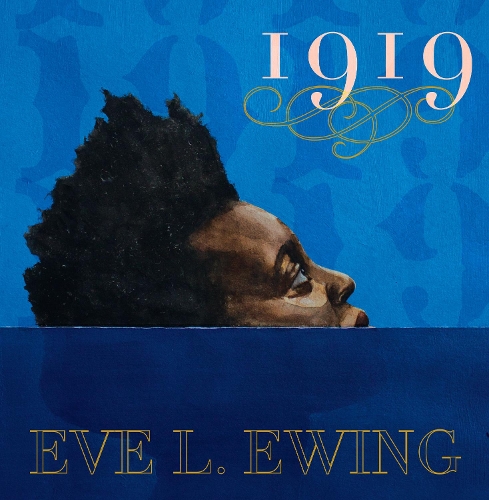
1919
(Paperback)
Publishing Details
1919
By (Author) Eve L. Ewing
Haymarket Books
Haymarket Books
6th August 2019
United States
Classifications
General
Non Fiction
811.6
Physical Properties
Paperback
88
Width 203mm, Height 203mm
Description
The Chicago Race Riot of 1919, the most intense of the riots that comprised the 'Red Summer' of violence across the nation's cities, is an event that has shaped the last century but is widely unknown. In 1919, award-winning poet Eve L. Ewing explores the story of this event which lasted eight days and resulted in thirty-eight deaths and almost 500 injuries through poems recounting the stories of everyday people trying to survive and thrive in the city. Ewing uses speculative and Afrofuturist lenses to recast history, and illuminates the thin line between the past and the present.
'The Zora Neale Hurston of her generation' Studio 360
'A truly rare cultural phenomenon: an artist who not only holds up a mirror to society, but makes herself a catalyst to change it' Chicago Tribute
Reviews
NPR Best Books of 2019
Chicago Tribune Best Books of 2019
Chicago Review of Books Best Poetry Book of 2019
O Magazine Best Books by Women of Summer 2019
The Millions Must-Read Poetry of June 2019
LitHub Most Anticipated Reads of Summer 2019
The genre-busting poet/scholar behind Electric Arches and Ghosts in the Schoolyard combines assiduously researched facts and bracing lyricism in this elegiac exploration of the 1919 Chicago race riot and the summer-song folk who were its human cost.
O Magazine
Eve Ewing is a poet of limitless possibility. She seems to get sharper and more daring with each book.
Poetry Magazine
A mixture of grand voices, hushed laments, and ardent dreams, 1919 resurrects forgotten history.
The Millions
Via a variety of poetic forms erasure, Golden Shovel, haibun Ewing evocatively shows, rather than tells, the ways in which history repeats itself.1919 is thoughtfully spare, accommodating questions and blank space. Through this economy of language, Ewing who also co-penned a play about poet Gwendolyn Brooks and writes a Marvel comic series invites readers into a conversation.
Chicago Tribune
These clarion and haunting poemssome psalm-like, others percussive, even concussive, all technically brilliant and sure to galvanize adults and teens alikeincisively and resoundingly evoke the promise and betrayal of the Great Migration and the everyday struggles of Chicagos Black community against vicious and violent racism. The riot a century ago, Ewing writes, left an indelible mark on the city, which she gracefully, imaginatively, and searingly illuminates with hope for a more just future.
Booklist Starred Review
The poems in 1919 ask how far weve come, and question ideas of progress and of thriving and surviving. On the centenary of the Red Summer, in an America hardly less violent and anti-black, Ewing wields a kaleidoscopic Afrofuturist style to illuminate a crucial piece of history and to imagine a path forward.
LitHub
Ewing blends past, present, and future, imagining the stories of those who lived through the riot and beyond, and inquiring into its lasting consequences.
Buzzfeed
Flecked with historical photos and evocative quotes from a post-riot commission report, filled with biblical and mythological references, seamlessly bending time and genre,1919is an unforgettable conversation-starter. Every poem leaves a bruise.
Longreads
Eve Ewings 1919 is a window into the mental and emotional lives of Black Americans in a Chicago, in an America, where time beckons oppressively. Exodus and deliverance to a promised land The eternal return of racist violence Time lends haunted hope. Maybe circular time, the eternal return, could cease and turn linear, toward exodus and deliverance. 1919 places readers in the minds and bodies of Black Chicagoans, Black Americans, and asks readers to see what has been, and what could be.
Vice
These poems are crafted and tense, inventive and full of energy.
The Rumpus
Through personal creation, historical research, cultural connection, and an uncanny natural rhythm of time folding in on itself, Ewing manages to capture the peoples stories and the devastating race riots with a fluid touch of hope, excitement, understanding, and an abiding sense of grief.
Third Coast Review
We cant recommend this book highly enough.
Zinn Education Project
Equal parts poetry collection and sweeping historical narrative, 1919 has the feel of an instant classic.
Danny Caine, Raven Bookstore
Author Bio
Dr. Eve L. Ewing is a sociologist of education and a writer from Chicago. She is the author ofElectric Arches, which received awards from the American Library Association and the Poetry Society of America and was named one of the year's best books by NPR and theChicago Tribune. She is also author ofGhosts in the Schoolyard: Racism and School Closings on Chicago's South Sideand the co-author (with Nate Marshall) ofNo Blue Memories: The Life of Gwendolyn Brooks. She is an assistant professor at the University of Chicago School of Social Service Administration. Her work has been published inThe New Yorker, The Atlantic, The New York Times, and many other venues.
